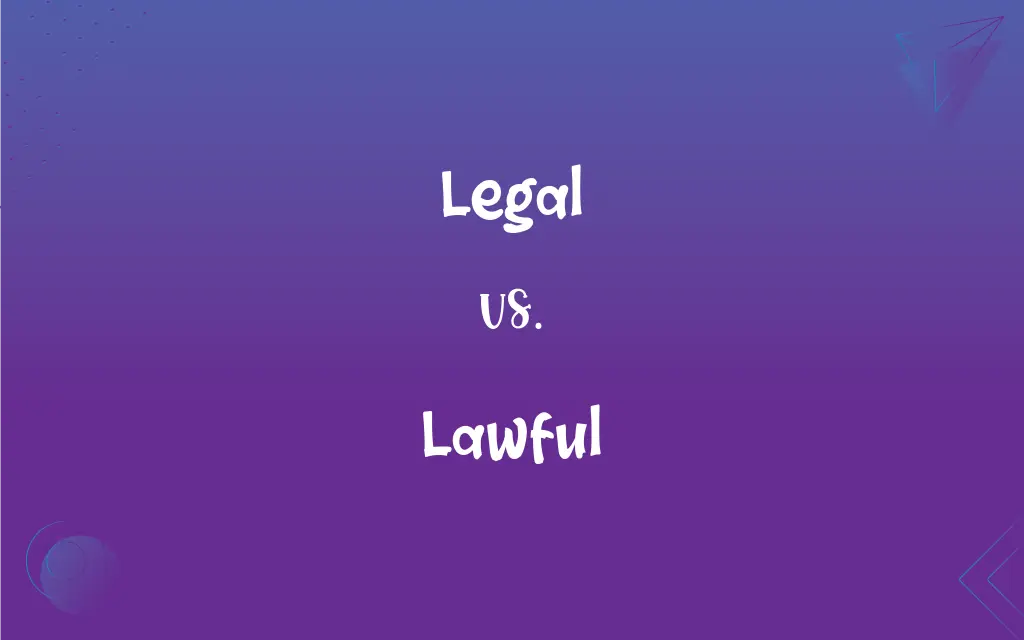Legal vs. Lawful: What's the Difference?
Edited by Aimie Carlson || By Janet White || Published on December 21, 2023
Legal refers to something permitted by law or relating to law, while lawful implies something is in accordance with the law.

Key Differences
Legal typically relates to the letter of the law, involving statutes, regulations, and formal legal processes. It's a term commonly used in discussions about legislative or judicial matters. Lawful, on the other hand, implies a broader adherence to law, including ethical or moral standards set by legal principles.
Legal can sometimes encompass actions permissible under the law but not necessarily ethical. For instance, certain business practices might be legal but not universally considered moral. Lawful suggests a more holistic compliance with the spirit and ethics of the law, often implying a moral judgment.
In some contexts, legal is used to describe matters specifically related to the legal profession or legal representation. Lawful, in contrast, is more often used in everyday language to signify general compliance with the law, not necessarily tied to legal technicalities.
Legal might also refer to a status conferred by law, such as legal citizenship or legal rights. Lawful suggests a broader, more general adherence to the principles of law, often used in the context of lawful behavior or lawful activities.
The distinction can be subtle and context-dependent. Legal tends to be more technical, referring to conformity with specific legal codes or regulations. Lawful suggests an overarching adherence to the principles of law, often interpreted with a sense of moral or ethical alignment with legal norms.
ADVERTISEMENT
Comparison Chart
Relation to Law
Specifically relates to law, statutes, and regulations
Implies adherence to the spirit and ethics of the law
Usage
Often used in technical or professional contexts
Used in broader contexts, emphasizing general compliance
Ethical Implications
Can be amoral, strictly adhering to written law
Often implies moral or ethical righteousness
Context
Pertains to legal rights, status, or professions
Concerns behavior or activities in a moral or ethical light
Nature
More specific and technical
More general and ethical
ADVERTISEMENT
Legal and Lawful Definitions
Legal
Pertaining to the law or its processes.
The company's actions were deemed legal by the court.
Lawful
Conforming to or allowed by law.
Their business operations were entirely lawful.
Legal
Conforming to the law.
She ensured all her business dealings were legal.
Lawful
Acting in accordance with the law.
She always ensured her actions were lawful.
Legal
Established or recognized by law.
He obtained legal citizenship after five years.
Lawful
Morally and ethically right within legal principles.
He insisted on taking only lawful measures.
Legal
Relating to the study or practice of law.
She pursued a legal career in corporate law.
Lawful
Established by the principles of law.
The police conducted a lawful search of the premises.
Legal
Allowed or enforceable by law.
The contract was legal and binding.
Lawful
Authorized or recognized by law.
Their marriage is lawful and recognized by the state.
Legal
Of, relating to, or concerned with law
Legal papers.
Lawful
Being within the law; allowed by law
Lawful methods of dissent.
Legal
Established or recognized by law
A legal right.
Lawful
Established, sanctioned, or recognized by the law
The lawful heir.
FAQs
Is something legal always lawful?
Not necessarily; something legal is permitted by law, but lawful also implies ethical or moral rightness.
Can something be lawful but against regulations?
It's possible for something to be ethically right (lawful) but against specific regulations (not legal).
Is lawful used in formal legal documents?
It can be, but legal is more commonly used in technical or formal legal contexts.
Does lawful imply a higher ethical standard than legal?
Often, yes; lawful tends to encompass ethical or moral righteousness beyond just legal compliance.
Do legal and lawful have the same implications in business?
Not always; a business practice can be legal (comply with law) but not seen as lawful (ethical or moral).
Do legal and lawful have different origins?
Yes, legal derives from Latin 'legalis', while lawful comes from Old English 'lagu', both meaning law.
Can a practice be legal in one country but not lawful in another?
Practices can vary; what's legal in one jurisdiction may not be considered lawful (ethically right) in another.
Is a legal decision always a lawful one?
Not always; legal decisions are based on law, but may not always align with broader ethical principles that define lawfulness.
Are legal actions always lawful in society?
No, society may view some legal actions as unethical or not lawful in a moral sense.
Is ignorance of the law a valid excuse in legal terms?
Generally, no; ignorance of the law is not typically a valid defense in legal terms, but this concept doesn't directly apply to lawfulness.
Can an action be lawful but not legal?
Rarely; lawful actions generally conform to legal standards, but there might be ethical or moral considerations.
Can a legal professional give lawful advice?
Yes, legal professionals can advise on matters that are both legal (conforming to law) and lawful (ethically right).
Can a person act lawfully but still face legal issues?
Yes, a person can act in a way that is ethically right (lawful) but still be in violation of specific legal statutes.
Are legal documents also lawful?
Legal documents are designed to be lawful, but their lawfulness can depend on their adherence to ethical standards.
Can a lawful act be challenged legally?
Yes, a lawful (ethical) act can sometimes be legally challenged if it conflicts with specific laws or regulations.
Is the enforcement of law always lawful?
Ideally, yes; however, the enforcement of law should also respect ethical and moral principles to be considered lawful.
Are legal and lawful interchangeable in everyday language?
They can be used interchangeably in some contexts, but they have distinct meanings in legal and ethical discussions.
Is a legally binding contract always lawful?
In principle, yes; however, the contract's content must also align with broader ethical standards to be considered lawful.
Does legal advice ensure lawful actions?
Legal advice aims to ensure actions are legal, but lawful actions also depend on ethical considerations.
Can laws be changed to make an action lawful?
Yes, laws can be amended to align legal standards with what is considered ethically or morally lawful.
About Author
Written by
Janet WhiteJanet White has been an esteemed writer and blogger for Difference Wiki. Holding a Master's degree in Science and Medical Journalism from the prestigious Boston University, she has consistently demonstrated her expertise and passion for her field. When she's not immersed in her work, Janet relishes her time exercising, delving into a good book, and cherishing moments with friends and family.
Edited by
Aimie CarlsonAimie Carlson, holding a master's degree in English literature, is a fervent English language enthusiast. She lends her writing talents to Difference Wiki, a prominent website that specializes in comparisons, offering readers insightful analyses that both captivate and inform.







































































